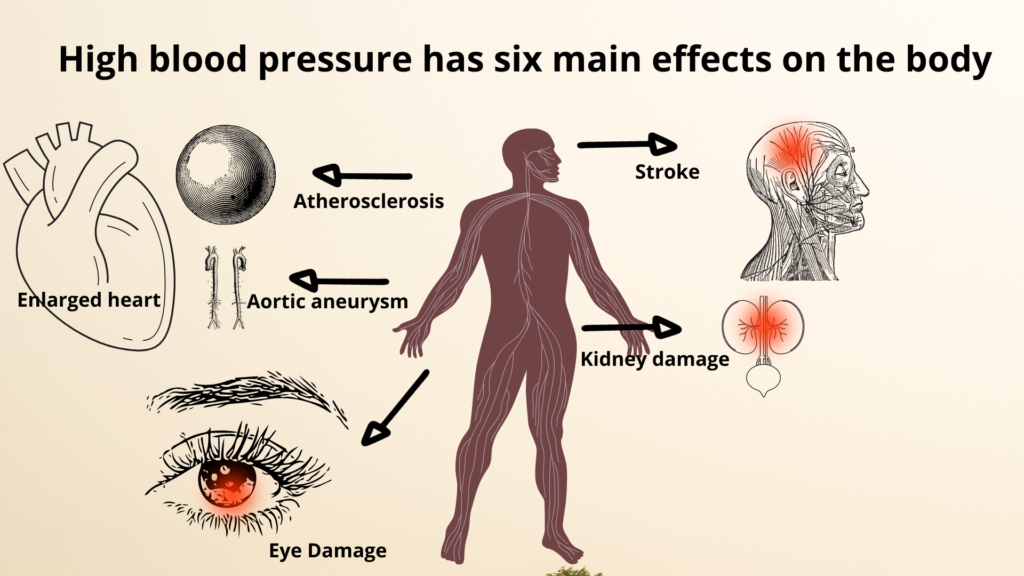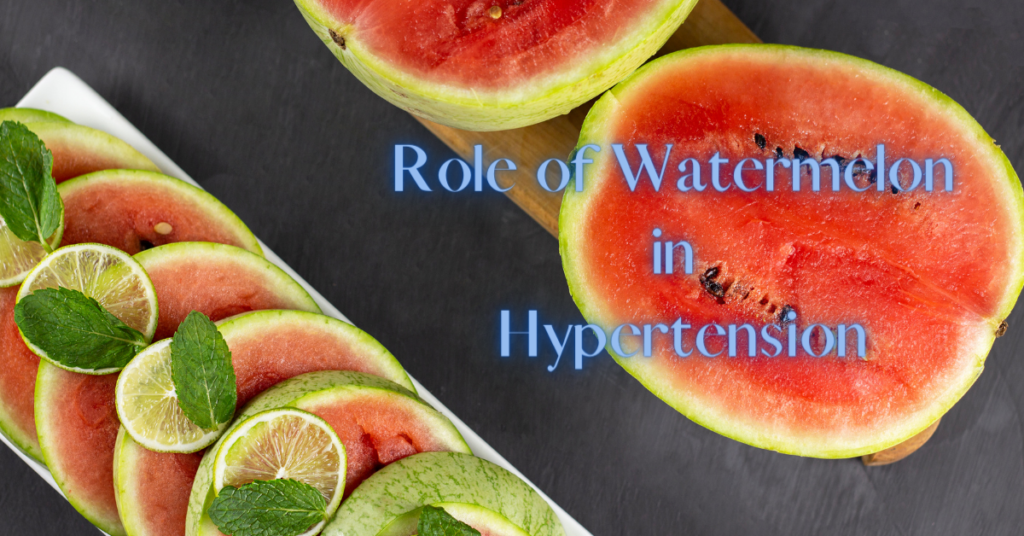Watermelon is one of the favourite fruits that many people like to enjoy during summer, as well as any other part of the year due to its juicy and fresh taste. It is also considered a healthy fruit since it contains high amounts of vitamins, minerals, and antioxidants and contains very low amounts of cholesterol and sodium. One study claims that eating watermelon halves for six weeks can help treat hypertension.
Watermelon may not be as organ-specific as Viagra, but it does appear to have a relaxing effect on the blood vessels in the body and improves circulation. This can help to lower the high pressure associated with hypertension.
Watermelon extract has been shown in studies with rats to help protect kidney function. The kidneys play a role in hypertension and healthy kidney function is required for normal blood pressure. It also helps prevent atherosclerosis which is the hardening of the arteries that occurs when plaque builds up inside your arteries. Plaque buildup weakens artery walls, narrows your arteries and reduces blood flow, contributing to high blood pressure.
What is hypertension?
Hypertension is a chronic medical condition in which the blood pressure in the arteries is elevated. Blood pressure is measured by two values ?? (systolic and diastolic) with a unit of millimetres of mercury (mmHg). The systolic value (first number) indicates the amount of force that blood exerts on the walls of the arteries as it moves through the body. The diastolic value (second number) represents the force when the heart relaxes between beats. Normal blood pressure is considered to be 120/80 mmHg or less. High blood pressure that reaches 140/90 mmHg or above can cause damage to the heart, kidneys, brain and other parts of the body. The higher your blood pressure, the greater your risk for health problems.

High blood pressure has no symptoms; most people do not know they have it because they never feel sick. If left untreated or uncontrolled, hypertension may lead to serious health problems such as stroke, kidney failure, heart attacks, vision loss and vascular dementia (dementia due to brain damage caused by impaired blood flow).
As many as 75 million Americans have high blood pressure, according to the National Heart, Lung and Blood Institute’s National Institutes of Health
Watermelon Composition
Watermelon is high in potassium, which can help lower blood pressure by blunting the effects of sodium. It also contains lycopene and citrulline, which are naturally occurring compounds that have been shown to reduce blood pressure and improve cardiovascular health.
A one-cup serving of watermelon has a mere 46 calories, but it also provides more than 20% of the daily value for vitamins A and C. The fruit also contains B vitamins including B1 (thiamin), B5 (pantothenic acid), and B6 (pyridoxine).
lycopene on watermelon
Lycopene is a phytochemical belonging to the carotenoid family of antioxidant compounds. These colour-producing compounds can help protect cells against damage by reactive oxygen radicals produced through normal metabolic activity, according to “Biochemistry.” Lycopene is responsible for the red colour of many foods such as tomatoes and watermelon, as well as guava, papaya, apricots, rose hips and blood oranges. Lycopene has been found to be particularly concentrated in the rind of watermelon
Citrulline on watermelon
Watermelon is one of the greatest sources of citrulline. Citrulline is a non-essential amino acid that assists in the maintenance of healthy blood pressure, artery and heart function, and also plays a role in releasing nitric oxide from endothelial cells. In addition to its association with arginine, citrulline may also increase levels of arginase which can be useful in treating atherosclerosis disease. This amino acid has also been found to increase the production of nitric oxide and decrease inflammation by supporting immune system functions.
Citrulline can boost your body’s natural ability to produce arginine, which in turn increases your body’s ability to make nitric oxide. This not only helps improve blood flow but also lowers blood pressure.
Mechanism of action by which watermelon reduces blood pressure
Watermelon contains high levels of L-citrulline, which stimulates arginine production by converting to ornithine, another amino acid that is also a precursor for NO. Arginine is converted to NO in the endothelium, the inner lining of arteries, by an enzyme known as endothelial nitric oxide synthase (eNOS).
How Much Should You Eat?
You should eat at least two cups of watermelon per day. A two-cup serving of watermelon is approximately 71 grams and provides 18 grams of sugar. This is important because you will want to limit your total daily intake of added sugars to no more than half of your total daily calories. So, if you are following a 2,000 calorie diet, no more than 100 calories per day, or 25 grams, should come from added sugars.
For diabetes management, try eating 1 cup of watermelon twice a day to improve insulin response. To lower blood pressure or cholesterol, eat 1 cup daily.
How to eat watermelon

Watermelon can be added as a snack or as part of a dish. It can be eaten fresh, juiced or made into a sorbet. The recommended serving size is 2 cups, which equals 1 cup of fruit or one-half cup of juice. To lower blood pressure, try adding watermelon to your diet or use it as a substitute for other foods high in sodium or fat. You can also try watermelon smoothies, salads and chilled soups.
High blood pressure can cause a variety of health issues, including:

Heart attack
Stroke
Coronary heart disease
Heart failure
Kidney failure
Other benefits of watermelon
Watermelon contains other nutrients and plant compounds that have important health benefits, too. They include:
Vitamin C: This vitamin is best known for its role in boosting immunity and wound healing, but it also helps your body produce collagen for healthy skin, hair and nails.
Potassium: Potassium helps regulate blood pressure and heart function. Eating potassium-rich foods like watermelon can reduce the risk of high blood pressure and stroke
Vitamins A and B6: These vitamins help maintain healthy skin, boost immune system function and regulate mood
Magnesium: Magnesium aids in muscle contraction, nerve function and bone development
Helps to hydrate the body
Helps in muscle relaxation
Improves blood circulation
Increases blood flow to kidneys
Watermelon improves blood flow.
Watermelon reduces oxidative stress.
Watermelon For weight loss.
Weight loss and watermelon go hand in hand. The fruit is low in calories and high in water content, making it an ideal food for dieters. Overweight or obese people who lose 5% to 10% of their body weight may lower their blood pressure by 5 mm Hg systolic (top number) and 2 mm Hg diastolic (bottom number). Losing weight decreases the workload on the heart and improves its ability to pump blood through the body. One way to lose weight is to reduce daily calorie intake, which can be done by increasing your intake of low-calorie foods such as watermelon

